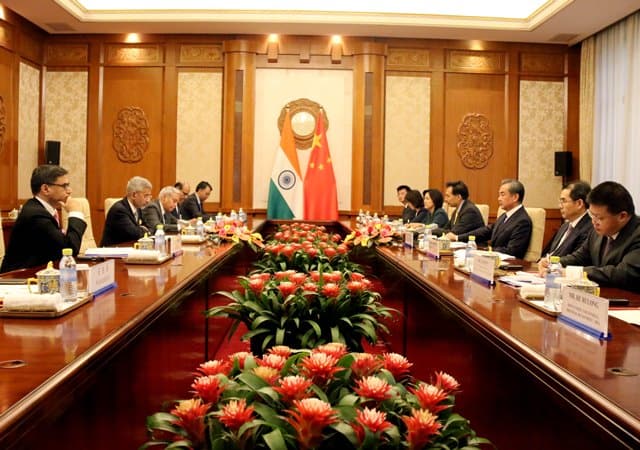
India Says LoC Status With China Intact
Speaking at the 4th India-China Media Forum in Beijing, External Affairs Minister S Jaishankar said that the leaders of the two countries had agreed that the “differences should not become disputes”.
His remarks came days after China objected to Ladakh being made a Union Territory and asked India and Pakistan to avoid actions that “unilaterally change the status quo” and exacerbate tensions. Jaishankar also expressed concern over India’s trade deficit in the bilateral trade and called for greater access to India’s pharmaceutical and IT products and services in the domestic Chinese market.
Meanwhile in New Delhi, the Centres issued a statement that read: “There was no implication for either the external boundaries of India or the Line of Actual Control (LAC) with China. India was not raising any additional territorial claims.”
The two countries share border running into more than 3,000 km.
Jaishankar, who met Chinese Vice President Wang Qishan in the morning, said they discussed evolving global situation and the larger rebalancing that reflects the rise of India and China as two large developing countries.
Referring to his meeting with Chinese Foreign Minister Wang Yi, Jaishankar said the two sides discussed the full gamut of issues including international situation, regional aspects and the bilateral relations.
He said the discussions were significant as the two sides prepare for President Xi Jinping’s visit to India for the 2nd Informal Summit later this year and celebrating the 70th Anniversary of the establishment of diplomatic relations next year.
Referring to the informal summit between Prime Minister Narendra Modi and the Chinese President in Wuhan in April last year, he said it was “a historic meeting” that has provided positive direction to the bilateral relations.
“There is a mutual agreement that as two of the largest and fastest-growing developing countries, representing almost one-third of the global population, stable and balanced development of our relations will not only be beneficial for our two peoples but also a factor of stability in this uncertain global environment. Our two countries have similar goals in terms of providing better opportunities for our peoples,” he said.
Jaishankar said there has been progress in an overall relationship since the Wuhan summit.
“The two countries agree that the maintenance of peace and tranquillity in border areas is essential for the smooth development of our relations. For this, the two armed forces have enhanced communication and are implementing various confidence-building measures,” he said.
The minister said that it is natural as neighbours and large developing economies that there would be issues in bilateral ties.
“The future of the India-China relationship will obviously depend on mutual sensitivity to each other’s core concerns. It is natural, both as neighbours and large developing economies that there would be issues in our ties. Properly managing differences is therefore vital. As our leaders agreed in Astana, differences should not become disputes. That is how India-China relations can remain a factor of stability in an uncertain world,” he said.
He said the positive direction of ties after the Wuhan Summit has opened up a world of new convergences.
“Exploiting this and taking our ties to a new level will require strong public support in both societies. The media can make a major contribution to that goal,” he said.
Jaishankar said the economic relationship between the two countries has seen some progress.
“The bilateral trade has increased but so too has our deficit, which is a matter of some concern. We appreciate the steps taken in the last few months by the Chinese side to enhance imports from India. These efforts could expand to include measures to enable greater access for our pharmaceutical and IT products and services in the domestic Chinese market,” he said.
Referring to the second meeting of the high-level Mechanism on Cultural and People-to-People Exchanges co-chaired by him and the Chinese Foreign Minister, he said it was an outcome of the consensus reached between Prime Minister Modi and President Xi Jinping during the Wuhan summit.
“It reflects our shared agreement that enhancing and strengthening cultural and people-to-people exchanges would contribute to the overall development of our bilateral relations,” he said.
(ANI)



